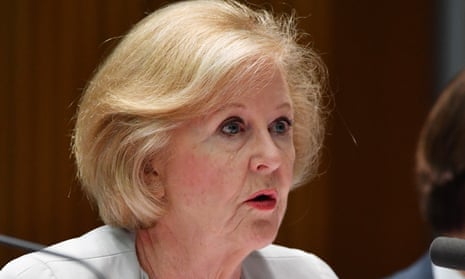Gillian Triggs, president of the Australian Human Rights Commission, has expressed alarm at Australia’s growing tolerance for “demonising” Muslims and hate speech directed at minorities.
Triggs said the controversy over an Anzac Day Facebook post by the writer and television presenter Yassmin Abdel-Magied – “a hijab-wearing Muslim woman” – was an example of a “growing tolerance for demonising Muslims generally”.
Abdel-Magied posted “LEST.WE.FORGET. (Manus, Nauru, Syria, Palestine … )” on her Facebook page on 25 April, before deleting it.
“Despite a speedy apology for what she conceded was a disrespectful comment on this day of remembrance,” Triggs said, “this relatively minor incident has been used to demand the removal of Abdel-Magied from the Council of Australian-Arab Relations, to constrain her right to freedom of speech and to demand that, as an Australian resident since she was a young child, she should return to Sudan, her country of origin.”
Triggs said she was encouraged that the foreign minister, Julie Bishop, had not bowed to demands for Abdel-Magied’s sacking from the government-run council.
But she said the vituperative attacks on Abdel-Magied were evidence of the increasing normalisation of hate speech against minorities, in particular Muslims.
“There is consistent evidence that Muslims are subject to higher rates of racism than pertains for all other racial and religious groups within the Australian community … the headscarf has become a lightning rod for attacking Muslim women.
“The Muslim community is disproportionately subject to ‘hate speech’ and discrimination in employment and the delivery of goods and services.”
The Human Rights Commission president, whose five-year term ends next month, told a packed Melbourne town hall that Australia’s laws to protect human rights were weak and were consistently undermined by parliaments that legislated away protections from abuse.
As the only common-law country without a bill of rights articulating fundamental human freedoms, “Australia is exceptional and, I believe, profoundly isolated in its failure to provide the legal tools to protect human rights”, she said.
Australia had failed to implement major international human rights treaties such as the international covenant on civil and political rights, the convention on the rights of the child, and the refugees convention – into domestic law. And successive parliaments had legislated away rights through increasingly repressive legislation.
“The protection of human rights through the law has become increasingly difficult, in part because courts do not have the legislative means with which to strike down laws that breach our fundamental freedoms.”
Triggs argued that the fiercely contested section 18C of the Racial Discrimination Act was “vital to the protection of all ethnic minorities in the community, against racial abuse and hate speech”.
“It is true that the law cannot prevent racist acts or words, but the law can set the benchmarks against which social behaviour can be measured. Then law can promote cultural norms that racist behaviour is unacceptable within the community.”
She said the Human Rights Commission did not support any amendment of 18C, that the section did not have a “chilling effect” on free speech, and that it had been applied for two decades in a fair and balanced way. Free speech, she said, was protected by the subsequent section of the act, 18D.
Triggs said the rise of populist nativism and anti-immigration nationalism was reflected in the electoral success of far-right political parties across Europe, the US and Australia.
“Each of these elements contributes to a toxic mix, fuelled by the media and by some of our political leaders.
“Over my professional life I can think of no more important time than now to speak up for the ideas that inform Australia’s commitment to multiculturalism: non-discrimination on the basis of race, equality before the law and cultural, racial and religious inclusion.
“We need to push back against political spin, alternative truths and the cynical view that the truth is anything you can get away with. We need to be vigilant in rejecting finely tuned and artfully camouflaged whistling to extreme rightwing groups.”
